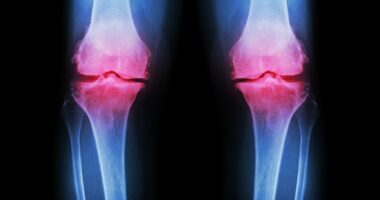Share this @internewscast.com
Aspirin is a widely used medication by millions in the UK every day. However, the NHS has issued advice indicating that some individuals could risk experiencing a painful side effect if they are not cautious.
In the UK, low doses of aspirin can be purchased over the counter as a daily painkiller, similar to paracetamol, at shops and supermarkets for less than £1. Higher doses can typically be prescribed by a doctor if necessary.
Unlike paracetamol, aspirin reduces pain, fever, and inflammation by blocking the body’s production of prostaglandins, hormone-like substances found in most cells that regulate blood flow, blood clot formation, and inflammation.
Aspirin can alleviate common aches and pains such as headaches, toothaches, and menstrual cramps. It is also effective for treating colds, flu-like symptoms, and lowering high temperatures.
Most individuals aged 16 and over can safely use aspirin. However, the NHS website notes that aspirin, which can be found in tablet, gel, or suppository forms, is not suitable for everyone.
Some individuals may be allergic to aspirin and similar painkillers like ibuprofen. Medical experts recommend that individuals with specific conditions consult a doctor or pharmacist before taking aspirin:
- high blood pressure (hypertension)
- indigestion
- gout asthma or lung disease
- liver or kidney problems
- heavy periods – as they can get heavier with aspirin
People who are pregnant, trying to get pregnant, breastfeeding or have ever experienced a blood clotting problem. Another group of people who are advised against taking aspirin is anyone who has a history of stomach ulcers.
A spokesperson for the NHS warned: “Aspirin can cause ulcers in your stomach or gut, especially if you take it for a long time or in big doses. Your doctor may tell you not to take aspirin if you have a stomach ulcer, or if you’ve had one in the past. If you’re at risk of getting a stomach ulcer and you need a painkiller, take paracetamol instead of aspirin as it’s gentler on your stomach.”
The NHS has a full guide on its website about the proper dosage of taking aspirin, as the right amount for you depends on the kind of aspirin you’re taking, why you’re taking it and how well it helps your symptoms. If your doctor has prescribed aspirin, take it for as long as they recommend.
More common side effects of taking aspirin
The NHS claims that “more than one in 100 people” will likely experience some mild side effects from taking aspirin, including mild indigestion and bleeding more easily than normal.
Experts explained that, because the drug helps to stop your blood from clotting, it can sometimes make you bleed more easily. For example, you may get nosebleeds and bruise more easily, and if you cut yourself, the bleeding may take longer than normal to stop.
Be cautious when engaging in activities that may cause injury or a cut. The NHS advises people taking aspirin should think about wearing gloves when using sharp objects like scissors, knives, and gardening tools
There was also a suggestion that people might switch to an electric razor instead of wet shaving. Using a soft toothbrush and waxed dental floss to clean your teeth might also help reduce your risk of cuts and bleeding.
See a doctor if you’re worried about any bleeding.

















